©
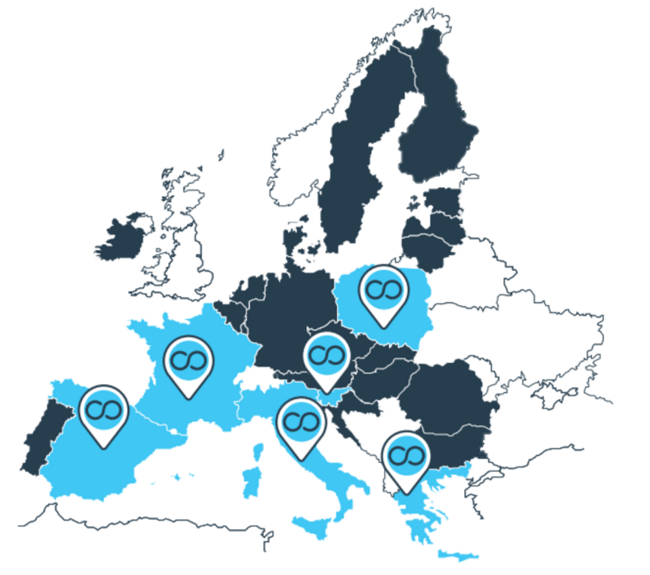
PARTNERS
12 Partners from 6 EU Countries, coordinated by ETRA, will work together for 42 months, to carry on the many Actions of the Project.

COORDINATING BENEFICIARY
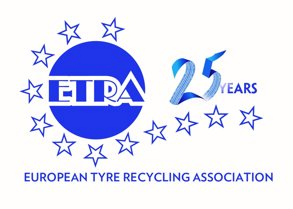
ETRA
ETRA, The European Tyre Recycling Association is the only European organisation devoted exclusively to tyre and rubber recycling. Founded 1994, currently the ETRA has ±250 members in 46 countries. ETRA membership reflects both the public and private sectors involved in the environmentally safe disposition of postconsumer tyres. Policy and decision makers as well as those charged with organising and connecting the links in the chain are represented. With a focus on both material and energy recovery, ETRA members
include collectors, retreaders, manufacturers of recycling equipment, research bodies, developers, users of new technologies as well as users of the materials in an expanding number of products and applications. The Mission of the association is to formalize Tyre Recycling as an independent, multi-sectoral industry involved in a long chain of activities that protect the environment and enhance the quality of life through the creation of new businesses and jobs.
ETRA is recognised by the European Commission as the organisation representing tyre recycling in the EU and partici-pated in the EU Recycling Forum as well as Parliamentary discussions regarding the revised Framework Directive, as well as the preparation of the UNEP Basel Convention 'Guideline for the identification and management of used tyres'. ETRA and its members sponsored the CEN Workshop Agreement on Tyre Recycling and material use, as well as the recent CEN Technical Specification on tyre recycling. Concerning Standards ETRA is now on three committees of ASTM international. ETRA initiated the CEN CWA on recycled tyre materials in 1999. In 2013 ETRA joined forces with ANTEL, the Italian organisation of municipal engineers to provide training sessions and organised a series of events. In 2018 ETRA became Member of ESTC (European Synthetic Turf Council).
ASSOCIATED BENEFICIARIES
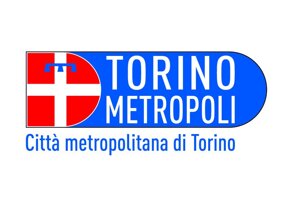
CITTÀ METROPOLITANA DI TORINO
The Metropolitan City of Turin has developed since 2008 a significant experience, even applied, in the field of road pavements to use rubber powder obtained from tyre recycling, as an additive. A first program, funded with own funds, in collaboration with:
-FISE-UNIRE - waste recycling association
-ECOPNEUS scpa - Tyre producer management company
-SITEB - Bitumen Association;
-ANFIA - Car producer Association
-Politecnico di Torino – Roads Department
was made with the realization of a part of the road Borgaro-Venaria using modified bitumen (about 18,000 square meters).
This first project was followed by a LIFE + project (TYREC4LIFE) from 2011 to 2015 and its continuation in 2016 thanks to funding from the Ministry of the Environment. Altogether, the two projects have paved the way for two (wet and dry) technologies with nearly 44,000 square meters of floor pavements. This project therefore aimed to facilitate "demand-building" actions, or initiatives to make these materials more competitive than traditional materials.
To this end, the role of the Metropolitan City of Turin in this project was to validate, by carrying out tests on the road pavements, done by its own laboratory, the mixtures already used in order to define the bases for the technical performance specifications for road pavements and disseminate the experiences gained in the previous projects to promote the use of modified bitumen modified with rubber powder for road design, construction and maintenance activities, thus creating the conditions for an effective development of this technology

COMSA
COMSA is a construction company, founded in 1891, which undertakes any kind of civil works, with railways as its core business. Today COMSA is positioned among the leading construction companies in the country with presence in more than 30 countries employing more than 5,000 people in Europe and internationally.
COMSA is the main company of the COMSA CORPORACIÓN group, which is a diversified group organised in three different areas: Infrastructures and Engineering, Services and Technology, and Renewal Energy and
Concessions.
COMSA is well-aware of the importance of constructing sustainable and eco-friendly infrastructures. Therefore, COMSA, with the support of its R&D Department, has been allocating a lot of effort to develop new durable and environmentally friendly construction materials to achieve greener infrastructures, while providing profitable solutions to waste products. As a result of this compromise with the environment, COMSA has developed innovative materials which have already been employed in COMSA's work sites.
Examples of these sustainable materials are: a rail profile for noise and vibration abatement made of end of life tyres, a concrete including sewage sludge to achieve a better resistance to frost or a concrete reinforcement based on metallic fibres obtained from end-of-life tyres
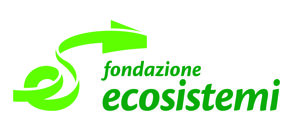
FONDAZIONE ECOSISTESMI
Since its foundation in 1998, Fondazione Ecosistemi has worked in a pioneering way to concretely transform the actions of its partners towards environmental and social sustainability.
As Italian leader in GPP (Green Public Procurement) and green and circular procurement, we help organizations to introduce ecological and social criteria in procurement, reduce the environmental impacts of production, protect decent work along supply chains, ensure gender equality, improve risk management and promote eco-innovation. Our activities in this area:
· Definition and inclusion of Environmental and Social Criteria in public administration procurement;
· Action plans GPP and monitoring systems;
· Help desk and on-the-job support services for the elaboration of green and sustainable tenders;
· Training of procurement managers;
· Mapping and evaluation of the sustainability of supply chains for public and private organizations;
· Adoption of social and environmental criteria within the private companies’ direct and indirect purchases.

FERROCARRILS DE LA GENERALITAT DE CATALUNYA
Ferrocarrils de la Generalitat de Catalunya was founded in 1979 to operate and administrate two historical lines with their origins in 1863 in the introduction of the Barcelona – Sarrià suburban train service. Over the years, new lines have been added to FGC and these historical lines have been improved and have grown with new passenger and freight services in Barcelona and the surrounding areas. This continuous growth, together with the diversification of the business into other sectors such as leisure and tourism, has made us an efficient public company distinguished by its high quality of service and efficiency in infrastructure management and transport operation. The numbers of the FGC services are the following:
· -91 million passengers/year and freight transport.
· -Workforce over 1900.
· -1301 circulations per day with minimum frequency of 112” in Barcelona-Vallès line.
· -Rail network stretching over 290 km of track with international, narrow, and Iberian gauges.
· -107 stations.
· -The only 2 rack railways existing of Spain.
· -4 funicular cable cars.
· -Touristic activities: 47 ski lifts and 146 km of ski runs, touristic trains.
Sustainability is one of the FGC key strategic lines. Hence, FGC is always focused on improving all the processes, materials and facilities involved in their services from a sustainable and environmentally friendly point of view, including the implementation of circular economy, the reutilization of materials and the use of recycled materials.
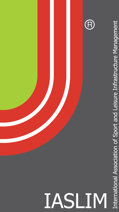
IASLIM
International Association of Sport and Leisure Infrastructure Management (IASLIM) is non-governmental and non-profit international organization and movement, for the purpose of promoting sustainable development and improving the management of sport and leisure infrastructure, throughout the world. The Association is registered at District Court Kranj, Slovenia, as international association of institutions, under registration number 3477584000. European Union’s Research Executive Agency in Brussels, Belgium, has registered the association as non-profit enterprise with PIC number 937815304.
International Association has 228 members in 36 Countries. They are public institutions, private companies, municipalities, universities, business schools, sport associations, professionals, experts, national and regional associations of infrastructure operators, which manage and operate over 5.000 sport and leisure facilities.
Mission of the Association is the development of network of public institutions, private firms, universities, research & educational institutions, ministries, regional and local communities, which plan, build, manage and maintain sport and leisure infrastructure. The main goals are: (1) sustainable development of sport, leisure and infrastructure, (2) introduction of “social” management, (3) implementation of new “green” technologies, (4) development of innovative programs for all people and (5) development of new types of entrepreneurship in sport and leisure business. Association will open a space for transfer of knowledge and experiences of planning, building, managing and maintaining sport and leisure infrastructure.
Program of the Association includes education, training, consultancy, standardization, certification, communication systems and organization of international conferences, seminars and training courses
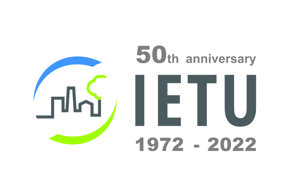
IETU
IETU is an R&D unit acting under the Ministry of Environment. IETU has a wide experience in development of environmental policy, strategic management and policy tools for sustainable development at different levels for the needs of state administration as well as regional and local governments including the area of waste management and prevention and strategic environmental impact assessments of policies. IETU scientists have a unique in depth knowledge on waste streams and waste systems generated in urban and per-urban areas of Poland gained from over 40 years of practical experience in analysis, characteristics and classification of different types of wastes both industrial and municipal, determination of recycling and reuse or recovery methods for different waste types, optimisation of waste management systems, consulting services on the selection of waste management technologies, development of technological concepts and feasibility studies for waste management facilities, evaluation of waste management alternatives.
IETU has a long track record-term experience in EU cooperation including participation in consortia of over 50 EU projects and coordination of 6. Recent relevant projects include: H2020 New-InnoNet( European Near Zero Waste Stakeholder Network) where IETU was responsible for the development of an ICT platform for mobilizing stakeholders incl. a technology clustering tool facilitating closing material loops for ELV, WEEE, plastic packaging waste and H2020 CINDERELA (New Circular Economy Business Model for More Sustainable Urban Construction) dealing with the management of different waste types available in urban and peri-urban areas for development of innovative construction materials. Beside technical tasks, based on these collaborations gained a multi-year experience in dissemination and communication activities and stakeholder interaction. IETU is a member of the European Circular Economy Alliance (ECERA).
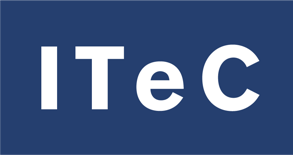
ITEC
ITEC is a non-profit private foundation at the service of society, working in the construction sector since 1978. Our goals as an organization to support innovation are the generation and transfer of information, knowledge and tools together with the provision of technological services, to improve the competitiveness of the construction sector stakeholders (public and private companies, and independent professionals).
ITEC provides services to orientate, assess and certificate innovative products that do not have an harmonized standard. ITeC is a TAB (Technical Assessment Body) member of the EOTA (European Organization for Technical Assessment) that issues officially recognized technical evaluation documents for innovative construction products.
ITEC also offers Life Cycle Assessment (LCA), market research, fundraising, training and ITEC also participates in the development of new tools and software to manage and make decisions during the life cycle of the construction process (bases of data / catalogs of construction products BIM).

KERIDIS
The company has been working in road constructions and civil engineering for two generation already. It operates all over Greece and takes care of the maintenance of the motorway Athens – Thessaloniki.
The company had experience throughout Europe and particularly in Portugal in 1999, in Germany and Austria in 2000; they carried on the first experience in Greece with the Rubberised Asphalt (“ROADTIRE” project, described in the following).
They owned and run a tyre recycling facility in Greece and work together with other Greek tyre recyclers. Keridis has great experience in hot mixing of aggregates with chemicals (bitumen and chemical additives), tyre recycling, civil engineering and public works.
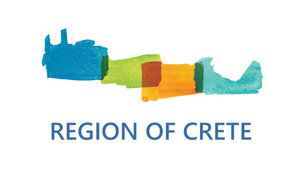
REGION OF CRETE
The Region of Crete (www.crete.gov.gr) is Public Law Entity, a second grade local self government authority of Greece organized and operated according to the Greek Law 3852/2010 “Kallikratis Program” and offers services for the benefit of the citizens. It consists of 6 General Directorates and 36 Directorates that aim at Economic, Social and Cultural Development of the Island of Crete and regarding the Development, Development Planning, Environment and Infrastructure, Regional Agricultural Economy and Veterinary Services, Transport and Communications, Public Health and Social Care, Civil Protection and Defence, as well as Internal Function. It designs, plans and implements policies at regional level as part of its responsibility, in terms of the sustainable development and social cohesion of the country, taking into account National and European Policies.
Region of Crete has also established the Regional Development Fund of Crete, constituted for management, according to the decisions of the regional council of credits, of the public investments program, the financing of public bodies and other legal persons, financing from EU programs and other international organizations and bodies, in regard to regional and special development programs of the Region. RDFC provides support for the development planning and technical support of the region, especially in the conduct of studies and research and also implementation of programs. The Regional Office in Brussels (Rond Point Schuman 14), acts at the Centre of Europe, focusing on Networking and Communicating with European Organizations , European Commission and European Parliament, and by encouraging potential Cooperation and Synergies with other Regional Offices in Brussels and European Networks, Brussels’ based.
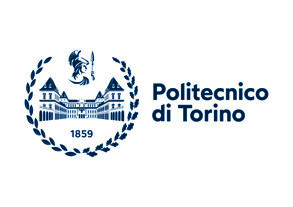
POLITECNICO DI TORINO
Founded in 1859, Politecnico di Torino is a leading institution in Italy and in Europe in the field of technicalscientific research, with a yearly budget of about €300 million and over 33,000 students enrolled in academic courses of different levels. Currently it is among the top Engineering and Technology universities in the world, the 33rd according to the QS University Rankings 2018 by Faculty, and 34th for Civil and Structural Engineering in the QS University Rankings 2018 by Subject.
POLITO international education network features about 460 bilateral agreements and 129 double-degree agreements with EU and non-EU universities, active participation in university networks and the establishment of international campuses.
Politecnico is part of some of the major European interuniversity networks, such as CESAER, CLUSTER, EUA, Sefi, T.I.M.E. These contacts allow spreading and disseminating project results to a wide number of institutions. POLITO employs 900 people among professors and tenured researchers. Each year POLITO draw up about 800 contracts with industries, government funded institutions, local organizations. The participation to many national and international projects allows Politecnico to accrue a great experience: in the FP7 Politecnico had more than 230 approved projects with a total EU contribution of 66 million Euro, ranking among the top 200 entities participating in FP7; in H2020 Politecnico has already 167 approved projects with a total EU contribution of 60 M€. It has also a strong experience in project coordination: the Research Support Department has been involved in the management of EU RTD projects since 1995. Politecnico di Torino is also active in many activities and projects aiming at the citizens involvement in science. POLITO is interested in developing permanent partnerships in research and education with industries that want to take advantage of university collaboration for innovation and development.
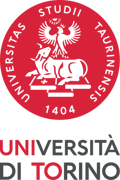
UNIVERSITA' DI TORINO
Università degli Studi di Torino (UNITO) www.unito.it is one of the largest Italian Universities, with about 80.000 students, 3.900 employees, 1.800 post-graduate and post-doctoral research fellows. Research and training are performed in 27 Departments, encompassing all scientific disciplines.
Professor Bono is responsible, for the city of Turin, of the GEIRD study: "Oxidative stress, aging andrespiratory diseases, multi-center epidemiological study, multi-case control and the general elderlypopulation in Italy. (www.geird.org), and of the ECRHS Study: “European Community Respiratory HealthSurvey” (www.ecrhs.org).
Below are the main research topics on molecular epidemiology of respiratory diseases, environmental and occupational health, and health promotion.
· Environmental and biological monitoring of workers. Assessment of the induction of oxidative stress.
· Exposure to formaldehyde, tobacco smoke and to other environmental risk factors in adult populations, in the infant e adolescent age, in physiological and pathological conditions, in living and working environment.Physiological, molecular and metabolic aspects measured in urine, blood, nasal and buccal cells.
· Bisphenols as endocrine disruptors and inducers of oxidative stress in adolescence and neonatal age. The presence of BPA and BPS in biological fluids of mother and newborn in an epidemiologically designed population (ethnicity, physiological, diabetic and hypertensive mothers).
· Sport environment and physical activity. The physical and chemical characteristics of sports fields and exposure to risk factors in athletes with different physical and sporting commitment. Health promotion by physical activity in the general population.
He is author of more than 140 scientific publications in national and international journals (SCOPUS 10/01/2021: H-index = 26, citations 2898), of dozens of interventions at international scientific meetings, including by invitation, and of 4 monographs

WMRC - WASTE MANAGEMENT RECYCLING CLUSTER
Waste Management and Recycling Cluster (WMRC) belongs to the elite group of 19 Polish national key clusters certified by the Ministry of Development and Technology of Poland, defined as the most effective instruments of development policy at the national and regional level. WMRC gather entrepreneurs from green economy area, focused on the circular economy dealing with, inter alia, waste management, recycling, recovery, creating technologies and devices, offering pro-environmental solutions and services, as well as key units of Polish science, operating in the field of research and development as well as the waste and packaging industry. The mission of WMRC is developing of the industry by providing and exchanging knowledge and experience with the R&D sector along with cooperation in related industries (including transport and logistics, chemistry, engineering and design services, IT, photonic, agro - food, textile). The aim of the cluster is to create a multidimensional platform for cooperation between business, research institutions, government units and non-governmental organizations. Cluster members cooperate in working groups e.g. Tire Group is active. There are 20 companies in it, which are focused on the following topics: increasing recycling levels, innovative solutions, circular economy in the polymer industry.
©
